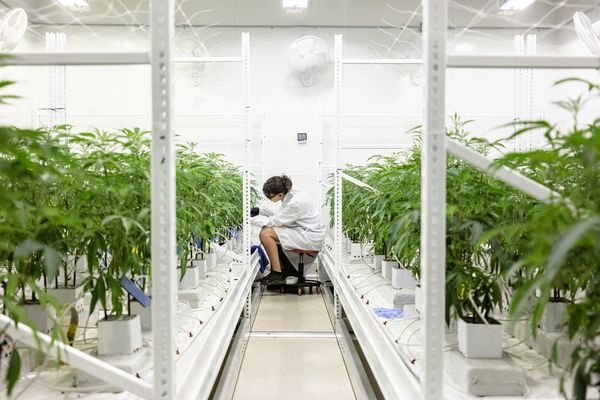Marijuana stocks had an absolutely abysmal 2019, and there's no way to sugarcoat it. Despite the expectation that pot stocks would push toward profitability, the resiliency of the black market, coupled with high tax rates in the U.S., and supply problems in Canada, ultimately sank cannabis stocks.
However, there have been a few exceptions to the rule, and marijuana real estate investment trust (REIT) Innovative Industrial Properties (IIPR 0.43%) certainly fits the bill.

Image source: Getty Images.
This cannabis REIT is one of the best marijuana stocks to own in 2020
While most pot stocks tumbled by a double-digit percentage, Innovative Industrial Properties ended 2019 higher by a cool 67%. This more than doubled up the gains of the benchmark S&P 500.
The secret to IIP's success is its transparent business model. This is a company that looks to deploy its cash by acquiring cannabis cultivation and processing facilities, then leasing these assets out for extended periods of time. In addition to reaping the rewards of rental income over the long-term, IIP also passes along annual rental increases that help it stay ahead of inflation, and collects a 1.5% property management fee that's tied to the current-year rental rate. In other words, even though we're talking about a company that earns its living by acquiring new properties, it does have a modest organic growth component built in.
Thus far, Innovative Industrial Properties' business model is working like a charm. Earlier this month, it acquired its 47th property and entered its 15th state. For added context, IIP only had 11 properties in its portfolio as of Jan. 1, 2019. Of these nearly four-dozen assets, the weighted-average remaining lease length is 15.5 years, with an average current yield on its $510.6 million in invested assets of 13.3%. In plain English, this just means that IIP will have a complete payback on its invested capital in a little under 5.5 years, with the rest pretty much being gravy.
Also, because Innovative Industrial Properties is organized as a REIT, it gets special tax treatment. In turn, it's required to pay out a significant portion of its earnings as a dividend to shareholders. This is why it's the only pure-play pot stock that currently pays a dividend – a dividend, mind you, that's in high-yield territory at 5.2%.

Image source: Getty Images.
Even Innovative Industrial Properties has risks you need to aware of
However, even top-performing stocks have risks, and Innovative Industrial Properties is no different. As shareholders learned this past week, these risks can (pardon the pun) crop up at any time. Here are the three biggest concerns to be aware of if you plan to invest in, or already own, Innovative Industrial Properties' stock.
1. Share-based dilution
The most plain-as-day risk when owning any REIT is the strong likelihood of share-based dilution, which shareholders found out the hard way this past Thursday, Jan. 23.
In order to acquire new assets and rapidly expand its portfolio, IIP needs cash. Although its owned assets are generating a profit for the company, the amount of operating cash flow being generated doesn't even come close to accounting for the company's capital needs while still in aggressive expansion mode. The only way to quickly generate capital, without turning to the credit markets, is for REITs like IIP to sell their own common stock.
This past Thursday, following the closing bell, IIP announced that it would sell 2 million shares of its common stock, and could offer an additional 300,000 shares, assuming its underwriters exercise their full option. This means IIP could raise in the neighborhood of $175 million in gross proceeds (note, IIP hadn't set an offering price at the time of this writing).
What you do need to know is that this 2 million (or 2.3 million) shares will increase the company's outstanding share count by almost 15%. While this dilution is typical for REITs, shareholders nevertheless pay the price.

Image source: Getty Images.
2. Improved access to financing in the U.S.
Another secret to Innovative Industrial Properties' success is the fact that access to basic financial services in the U.S. has been iffy, at best. Most vertically integrated multistate operators haven't had access to nondilutive forms of financing (e.g., loans and lines of credit with a bank) and have, therefore, been turning to sale-leaseback agreements with IIP.
A sale-leaseback agreement involves a cannabis growing and/or processing company selling one or more assets to a marijuana REIT in exchange for cash. This cash is used to bolster a balance sheet, as well as fund ongoing operations and expansion. Meanwhile, the REIT then leases its newly acquired property back to the original owner, thereby locking that company in for a period of 10 to 20 years as a tenant. IIP has been able to pick up a good chunk of its properties in recent months from sale-leaseback agreements.
However, if access to nondilutive forms of capital becomes easier, then IIP's biggest advantage may disappear. Interestingly, Cresco Labs (CRLBF 4.20%) is one of the multistate operators that sold, and subsequently leased back, two properties to IIP in 2019. But just this past week, Cresco Labs also announced the signing of a senior secured credit agreement that'll give it access to up to $200 million. If Cresco Labs winds up being the tip of the iceberg, and/or Congress enacts some form of cannabis banking reform, IIP's niche as a sale-leaseback kingpin will be no more.

Image source: Getty Images.
3. Increasing competition
Finally, it's important for Innovative Industrial Properties' shareholders to realize that they're not going to be the only game in town. If a company can raise capital and achieve REIT status, it could easily become a competitor for sale-leaseback agreements and cannabis-focused assets.
For instance, the Ontario-based Subversive Real Estate Acquisition REIT raised $200 million via its initial public offering last week (Subversive will trade on the NEO Exchange in Canada). This REIT is actually a combination of three investment firms, one of which, Subversive Capital, raised $575 million in 2019 for a cannabis special-purpose acquisition company. Modeled after IIP, Subversive will look to acquire and lease retail and industrial assets throughout the cannabis space.
Of course, shareholders should also know that competition is inevitable, and risks like share-based dilution are usually very short-term concerns. Even with these risks present, I see plenty of long-term upside to Innovative Industrial Properties' stock.







